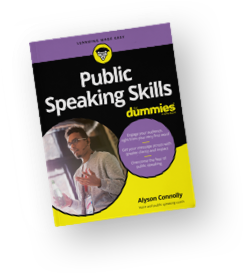“I never speak in public”, said the IT guy at a function that I was at recently. “Really,” I replied, “Do you ever talk to your boss or colleague about what is going on in your department? When you are at a function like this one, do you ever explain to someone what you do?” That, my friend, is public speaking. You don’t have to be on a stage with a mic headset and a Power Point behind you.
The definition “Public Speaking” is just as it sounds: speaking publicly. We do that all the time, don’t we?
Land those thoughts
Whether you are speaking to a colleague about a project or the teacher at your kids’ school, you need to be clear and speak slowly enough so that your listener understands you. Rushing your speech makes the listener work really hard so sometimes he just zones out. Plus, if you have to repeat yourself that is tiring for you, too!
My friend is an ultra sound tech and meets many patients each day. She has to tell the patient exactly what to do when they get into the room and has to repeat this many times a day. That is public speaking. She has to be clear and has to explain the procedure precisely in an expedient time frame. After all, there are other patients waiting!
Your Elevator Pitch
Think of it as a few sentences that describe what you do in the time it takes the elevator to go down. Do you need one? If you are in business, you do. If you are a human being you do. For example: Hi, I’m Alyson Connolly. I’m a voice and Public Speaking coach. I work with people who are good but want to be great, those who would rather die than speak in public and those whose accent gets in the way of their clarity.” That starts a conversation where I can go into what I do with more detail.
Confidence
Some of my clients have problems speaking in crowds and others in small groups. In both instances they are worried about being judged. Are they saying the right thing? Will the group approve? Are their clothes too flashy? The key is not to focus on yourself but to focus on your message. What is it that you want to get across? What do you want the listener to come away with?
Our mind can play havoc with our confidence. Henry Ford’s saying, “If you think you can do it, or think you can’t do it, your right” is so true. How many times have you wanted to talk to the VP at a party, you know just to ask about her kids and you think, “She is a busy person and doesn’t have the time for small talk.” You’ve just blown a perfect opportunity to get to know each other in a calm and relaxed environment.
How about thinking positively that you will go up to the VP and have a great conversation? Changing your thinking can help gain confidence but so does taking a look at your body language. If you are working with a fellow coworker and discussing details about an upcoming project and you are looking down at the floor, does that exude confidence? Your coworker may be afraid that he is going to do all the work.
When I was in junior high walking to school, my Mom could see me walking down the street. Often I’d hear her shout “Alyson June, put those shoulders back!” I thought she was nuts, and I was super embarrassed, but I did it. And you know what, that made me feel more confident. Don’t believe me? Take a look at Amy Cuddy’s Ted Talk on Body Language.
The Interview
A colleague of mine was on a panel to hire someone for a position at her company. It came down to two people: one who had worked part time at the company previously and another from out of town. Both gave solid presentations and clearly knew their stuff. At the interview, the candidate who was known by the company, slouched in his chair, looked downward and didn’t appear that he cared. Needless to say, he didn’t get the job. . The entire job interview is a performance. From the moment you walk in the room, until you leave. (Amy Cuddy studies the interview)
Practice
You know you have to practice your presentation, but you also have to practice answering the interview questions. Every one of my clients who I have worked with on mastering their interview were asked “why do you want this job? ”. Practice the answer.
Be clear and concise.
Come up with all kinds of other questions in your head that you may be asked and practice them out loud. Then when you are asked, you can answer in a confident manner. Rather than blundering out that you “um really want this job cause, um”… After all, regardless of what kind of company, I just bet they want to hire someone that is confident and in control.
So you see, we are all public speakers. Make sure you’re ready, practiced and confident the next time you get a chance to make a difference.

